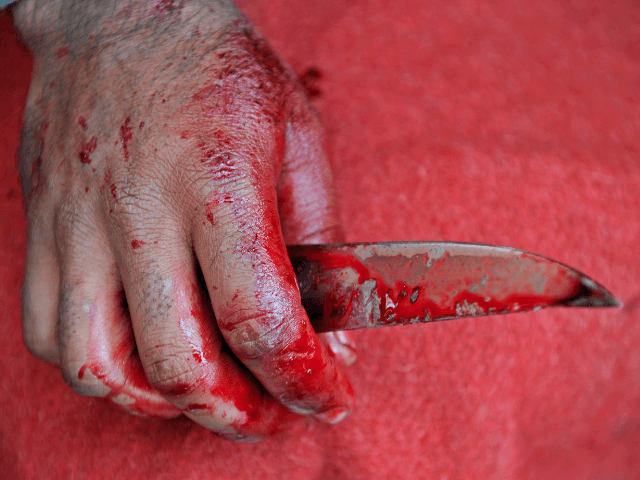An Islamist radical admitted to killing a Jewish businessman in Uruguay as a mode of “following Allah’s orders,” stabbing the man ten times in the back after following him down the streets of western Paysandú city.
A dramatic scene unfolded Tuesday when Carlos Omar Peralta López, who years ago began calling himself “Abdullah Omar” following his conversion to Islam, stabbed David Fremd ten times in broad daylight while yelling “allahu akbar” and injured Fremd’s son. He is facing charges of aggravated homicide, hate crimes, and battery (for the injury to the son). Peralta was employed as a teacher and known to have “a religious bond to Islam.” He reportedly told investigators that he “killed a Jew following Allah’s order.”
Reuters notes that Peralta initially refused to take the blame for the incident, instead repeatedly asserting that, whatever his actions, they were justified by Islam. According to the judge in the case, “He consistently talked about the religious motivations but did not once recognize committing the crime. … He said his actions were in the hands of Allah.” Upon leaving his first court appearance, Peralta recited the Shahada in Arabic: “There is no god but Allah and Muhammad is his prophet.”
Finalizing the charges, the judge in Peralta’s case explicitly described the killing as a hate crime: “The act of highest human violence, motivated by the hate he felt towards the religious and ethnic community that his victim represented.” He added, “This is a person that professes a faith historically belligerent towards Judaism,” noting that Peralta had been involved with law enforcement in 2006 after having “an incident of words” with the Israeli ambassador in Uruguay after berating him “for the death of Palestinian children.” Peralta had later claimed that he was being “persecuted” by Jewish people, and that this had stunted his career.
While the court noted that Peralta personally identified as an Islamic radical, law enforcement officials told Reuters that they do not believe he is part of a terrorist cell or has ties to any known terrorist organizations. “No links arise with other people inside or outside the country, nor with any group,” the nation’s interior minister said, noting that police had spent the two days following the stabbing searching through Peralta’s computer and telephone and found no contacts associated with terror groups.
An eyewitness at the murder scene, however, told Uruguay’s El País that Peralta had claimed to be a member of al-Qaeda. José Ramón Soca López, who ran after Peralta following the stabbing and detained him for 15 minutes before police arrived, said that the man had identified himself as a member of the jihadist group. While Soca held him down, he says Peralta “was always lucid and very aware of what he had done. He told me he felt discriminated against because of religion, that the businessman knew very well why he had killed him and that he was part of Al Qaeda.”
The El País report cites unnamed witnesses describing Peralta in his daily life as “a crazy barbarian always yelling in the middle of the hall” at a local cyber café. Law enforcement have not yet made any public conclusions regarding investigations at the local cafe.
Uruguay’s Jewish community has reacted with horror. “We haven’t had a lot of anti-Semitism here, so this incident is surprising,” the nation’s chief rabbi Ben-Tzion Spitz told reporters, noting that the Jewish community in Uruguay is about 15,000 strong.
Authorities note, however, that radical Islam is a growing problem. The nation’s El Observador newspaper reports that police have alerted Uruguayans that multiple other potential jihadists are under law enforcement surveillance. Police tell the newspaper the individuals being monitored have no relation to this case, but “are suspects because of extremists stances or ties with people capable of committing acts of violence.”
America’s chargé d’affaires in Montevideo, Bradley Freden, issued a statement warning Uruguayans to be vigilant. “If someone thinks there is no threat of terrorism because this is a small, peaceful, and calm country, wake up, because there are possibilities … terrorism is here.”
Uruguayan police have dealt with at least four threats to the Israeli embassy in Montevideo in the past two years, all in the form of suspicious devices left near the embassy designed to look like explosives, but ultimately found to be benign. The latest such package was found near the embassy in November amid an anti-Israel rally taking place in front of the embassy. Similar non-explosives were found on two other occasions in 2015 and once in November 2014. At the time, Iranian nationals were deemed the prime suspects.
In response to the investigation of the first device found, Iranian consultant Ahmed Sabatgold, whom police sought to question about the incident, fled the country and returned to Tehran. The Iranian government accused Israel of planting the devices “in order to damage Iran’s image.”

COMMENTS
Please let us know if you're having issues with commenting.